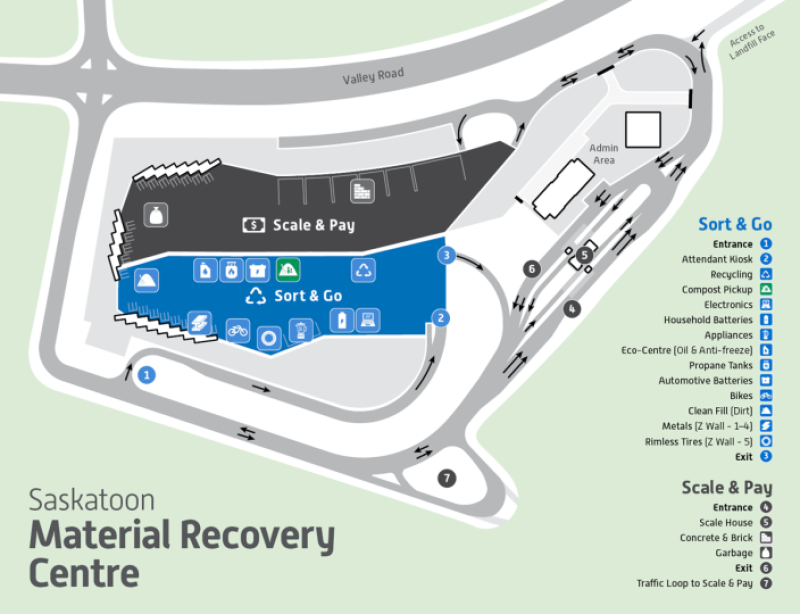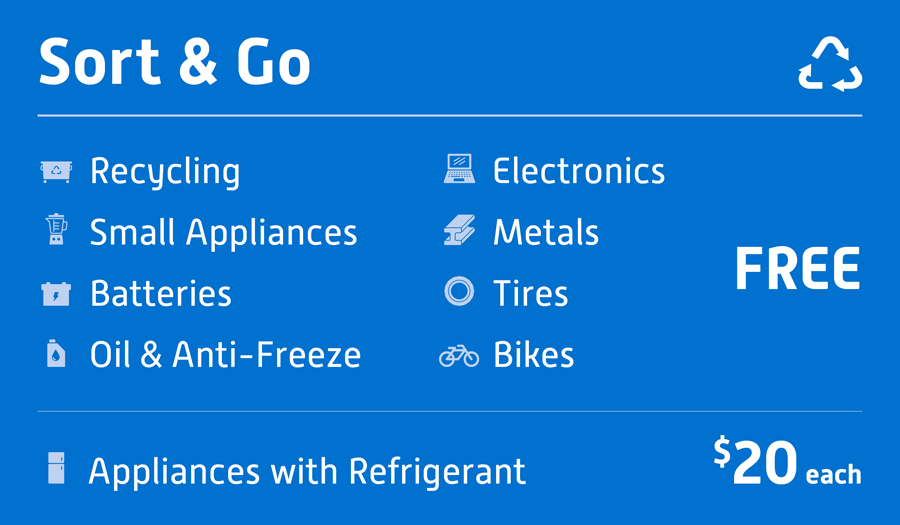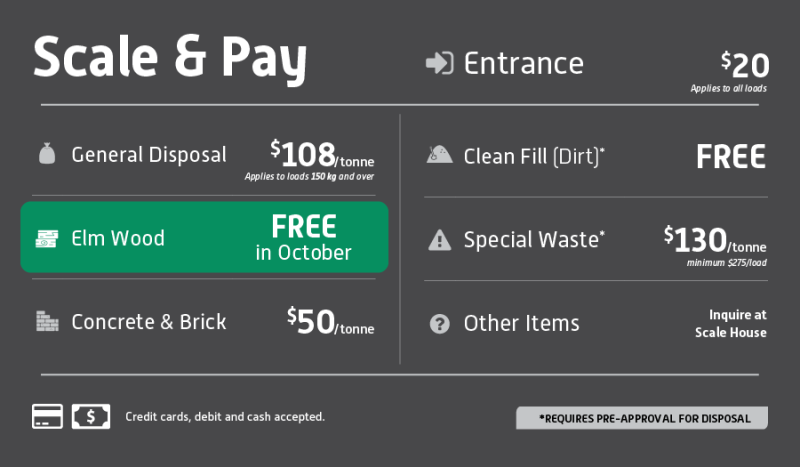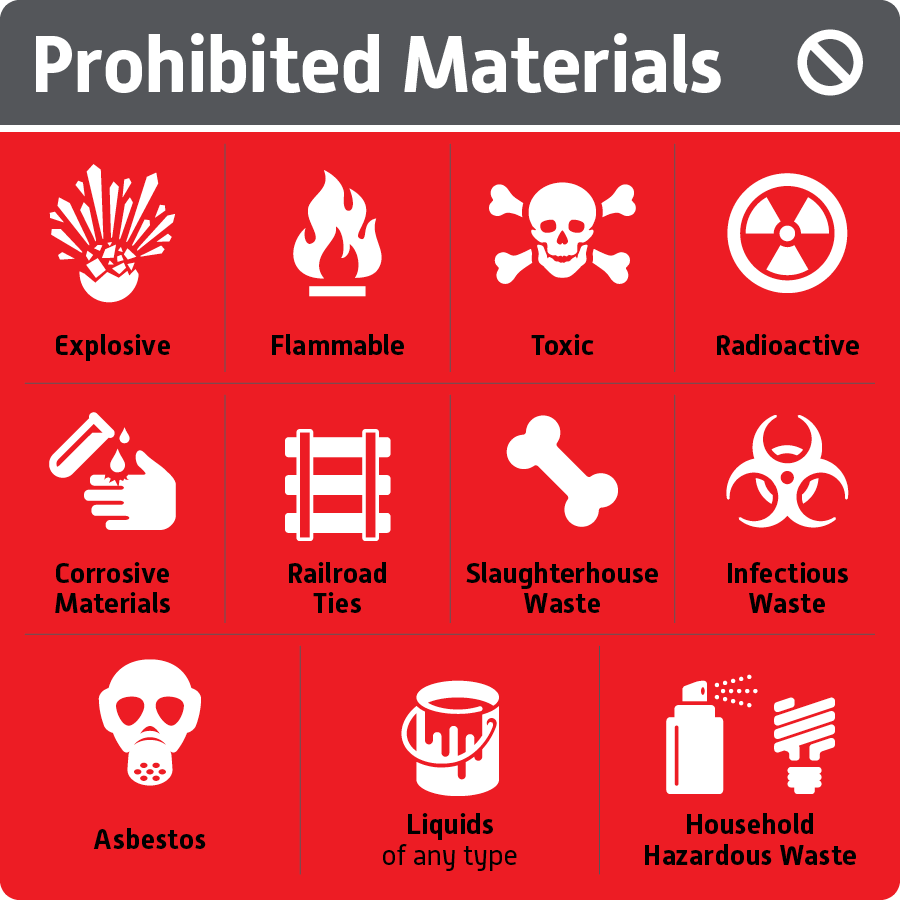Saskatoon Regional Waste Management Centre
Material Recovery Centre and Landfill
The Material Recovery Centre (MRC) is designed to be a one-stop facility that functions to provide easy, efficient, and cost-effective waste diversion and landfill transfer. As part of the Saskatoon Regional Waste Management Centre, the MRC will improve the City’s waste diversion rate with more materials being diverted from the landfill, getting us one step closer to our goal of 70% diversion.
Location
42 Valley Road, Saskatoon

Hours of Operation
- 8:00 a.m. to 4:45 p.m.
- Open 7 days a week
- CLOSED: December 25 & January 1
Payment Methods
- Debit
- Credit (Visa, Mastercard, American Express)
Reminders
- Sort your items prior to arrival. This will save you time when disposing of your items in the correct place.
- Weekends are busy at the MRC, especially after 9:30 a.m. Arrive early and avoid line-ups.
- Please bring along help to unload your materials if required. For their protection and safety, staff are unable to assist customers unloading items.
- Personal Protective Equipment (PPE) is required for all customers with tip trailers unloading at the landfill tipping face. A hard hat and high-visibility vest/shirt/jacket/suspenders are required. If you don't have adequate PPE, you will be required to manually unload at the transfer bins.
- Lift capabilities on trailers or vehicles must NOT be used at transfer bins, due to safety concerns.
- A $20 entrance fee will be charged for all vehicles entering the facility to be weighed, regardless of whether any materials are dumped.

Sort & Go
Recycle and save! There are many items that can be dropped off for free at Sort & Go. More materials, including household hazardous waste, will be accepted in the future.

Before You Arrive
Explore the list above to see all of the accepted items at Sort & Go. Recycling, small appliances, batteries, oil and anti-freeze, electronics, metals, rimless tires, and bikes can all be dropped off for FREE. The City works with a number of vendors to divert and recycle these items.
To ensure a quick and speedy visit to the MRC, ensure all of your items are sorted before you arrive. Arriving early can help avoid line-ups. Please bring along help if required to unload your material. For their protection and safety, MRC staff are instructed to avoid lifting or handling items from personal vehicles.
Recycling
- Your clean recyclable material can be tossed loosely into the recycle bins at the MRC.
- Place shredded paper in a clear, tied plastic bag.
- Remove caps from milk jugs and beverage containers, give them a quick rinse, flatten them, and they'll be ready to recycle.
- Flatten all cardboard boxes.
Accepted Items
Paper Products
- Paper and cardboard
- Newspapers, flyers, junk mail
- Corrugated cardboard
- Empty cereal, cookie and cracker boxes (remove liners)
- Magazines, catalogues, paperback books
- Telephone books
- Kleenex boxes, toilet paper rolls, paper towel rolls
- Copier paper
- Shredded paper (in a clear, tied plastic bag)
- Clean pizza boxes
- Paper egg cartons
Plastic containers
- All food and household plastic containers # 1-7
- Laundry jugs and milk jugs
- Juice and drink boxes
- Shampoo, conditioner and mouthwash bottles
- Cleaning product bottles
- Take-out containers, bakery and produce containers (called clam shells)
- Yogurt, sour cream and margarine containers
- Planting trays and flower pots
- Lids from coffee cups
Foil and cans
- Metal cans
- Soft drink cans
- Aluminum trays and foil (clean)
- Pet food cans
- Jar lids
Household glass
- Wine, spirit and beer bottles
- Food jars - lids off
Not Accepted
- Polycoat (paper coffee cups, ice cream cartons, to-go soup containers)
- Black Plastics (takeout containers, coffee cup lids)
- Plastic Film (Grocery bags, Plastic wrap, Soft/stretchy plastics)
- Food contaminated paper or cardboard
- Waxed or plasticized paper
- Diapers
- Soiled Kleenex, napkins and paper towels
- Styrofoam
- Plastic toys, Tupperware or other plastics without a #1-7 symbol
- Motor oil containers
- Anything smaller than a credit card is too small to be sorted by recycling equipment
- Needles
- Outdoor lawn furniture
- Pyrex or dishware glass
- Windows or mirrors
- Ceramics or porcelain
- Hazardous materials, such as needles and propane tanks are accepted NOT in the recycling bins. They pose a danger to staff and can impact the efficiency of the recycling process.
- Plastic COVID-19 Barriers (acrylic): While this material does fall under #7 plastics, it is not marketable; therefore it is considered garbage. Flexible plastic sheets or screens are also considered garbage. If you choose to remove your barriers, anything larger than 2 ft x 2 ft must be taken to the landfill or reused for alternative purposes.
Still not sure if it’s recyclable? Ask the Waste Wizard at the bottom of this page or click here.
Small Appliances
Small appliances can be dropped off for free. Examples include: fans, blenders, rice cookers, coffee makers, toasters, hair dryers, pressure cookers, air fryers and similar items.
Oil & Anti-freeze – Eco-Centre
Visit Sort & Go to drop off items at the Eco Centre.
You can recycle:
- Used oil (up to 500 litres)
- Used antifreeze (up to 100 litres)
- Used oil and antifreeze must be in original containers (liquids in household containers such as milk jugs cannot be accepted).
- Used oil, antifreeze, and diesel exhaust fluid (DEF) containers (up to 500 litres of total container capacity, regardless of the quantity).
- Used oil filters: 10 large size, 20 small/regular size, and no paper filters
Note: Customers are required to unload containers from their vehicle and place them in the appropriate drop-off receptacles. MRC staff will then transfer the product(s) into the appropriate storage tank/area. Customers with empty 20-litre pails should be clean, stacked, and have the lids removed. Full 20-litre pails must have handles and should have a clean exterior.
Metals
Scrap metal can be dropped off for free. Examples include: BBQs, rebar, filing cabinets, plumbing fixtures, frying pans and other worn-out metal items.
Rimless Tires
Rimless tires can be dropped off for free. Examples include: passenger vehicle, motorcycle and ATV tires.
A maximum of 10 tires is allowed per customer. The Tire Stewardship of Saskatchewan offers recycling for larger quantities.
Bikes
Bikes can be dropped off for free. The City has partnered with Bridge City Bicycle Co-op (BCBC) to recycle them and give them new homes through their organization.
Appliances
Large appliances can be dropped off for free. Examples include: stoves, dishwashers (metal tub only), washing machines and similar items.
A $20 fee per item will be applied for appliances with refrigerant - refrigerators, freezers, air conditioners, dehumidifiers and water coolers. The fee covers the cost of refrigerant removal.
Electronics
Electronics can be dropped off for free. Examples include: Display devices, desktop computers and computer components, personal portable audio video systems, countertop microwave ovens, desktop printers, home theatre, video gaming systems and similar items. The city has partnered with the Electronic Products Recycling Association (EPRA). For more information, click here.
Batteries
Rechargeable batteries weighing less than 5 kg, including computer and household batteries, can be dropped off for free. The City has partnered with Call2Recycle to recycle the batteries. For more information visit Call2Recycle.
The MRC does not accept electric bicycle batteries. Please visit recycleyourbatteries.ca to find a location in Saskatoon for drop-off.
Household Hazardous Waste
Household Hazardous Waste can be dropped off at Sort & Go every Wednesday, beginning May 7, 2025 from 8:30 a.m. to 4:00 p.m. Visit saskatoon.ca/hazardouswaste for more information.
Scale & Pay
Any items that cannot be recycled and need to be disposed of at the landfill should be brought in via Scale & Pay. Concrete and brick must also be weighed in but have reduced rates. This is also the access point to the landfill face for commercial haulers.


Concrete & Brick
The City has partnered with Acadia Paving Ltd. to recycle concrete and brick collected at the MRC. Both materials have decreased tipping fees to incentivize increased diversion from the landfill while also ensuring cost recovery.
Elm Wood
You can help prevent DED by disposing of elm wood immediately at the Saskatoon Landfill. The disposal fee for all elm wood (commercial and residential loads) will be waived. This initiative aims to encourage the prompt and proper disposal of elm wood, reducing the risk of disease transmission to healthy elm trees. The City wants to remind people that an elm pruning ban is in place each year from April 1 until August 31; however, this new initiative means that any elm wood that has been completely removed, previously been cut, has fallen or was intended as firewood can be disposed of for free.
If you have elm wood, it must be disposed of immediately and properly to help prevent the spread of Dutch Elm Disease. It is illegal to store, use, sell or transport elm wood. It must be disposed of at a designated elm wood disposal site such as the landfill immediately. It must be disposed of at the landfill or at the transfer bins in Scale & Pay. For more information on Dutch Elm Disease and how to identify it, click here.
Per the Dutch Elm Regulations, every person who prunes or removes an elm tree shall dispose of the elm tree by transporting it to the nearest elm tree disposal site for the municipality in which the elm tree is located during the next operating hours of the elm tree disposal site after the pruning or removal of the elm tree. The disposal site for Saskatoon is the landfill.
Clean Fill and Tree Waste
Clean Soil
The landfill accepts clean soil, also called clean fill, free of charge. There is an approval process for the acceptance of clean soil at the landfill.
Clean soil cannot be mixed with:
- Wood
- Stumps or Logs: Customers are encouraged to reduce the size of tree waste as much as possible and to drop off all non-Elm tree waste at a City Compost Depot.
- Branches
- Concrete
- Asphalt
- Metal parts and pieces
- Plastics
- Ceramics and masonry materials
- Rocks greater than four (4) inches in diameter
- Refuse and garbage
- Chemical substances that are regulated by the Provincial Ministry of Environment (these include petroleum hydrocarbons, halogenated hydrocarbons such as tetra & trichloroethylene, polycyclic aromatic hydrocarbons, PCBs, heavy metals, and chlorides).
Approval Process for Soil Delivery
When is approval required?
- Soil deliveries originating from a single property that will exceed 10 loads from a single site must be pre-approved.
- Single loads from residential sites or loads from private citizens are exempt from the process.
If you will have less than 10 loads from a single site, and answer ‘Yes’ to the following questions, fill out the Soil Delivery Application.
- Does the soil contain or has the potential to contain non-natural chemical substances, has there been any fuel, oil, or any other chemicals spilled on the soil (before or after being loaded into the truck)?
- Does the soil originate from a property that is, was, or adjacent to a gas station?
- Does the soil come from a commercial, institutional or industrial site?
If you have more than 10 loads from a single site, complete the Soil Delivery Application.
- All applicants will be required to have a landfill business account number that will be used to track soil deliveries.
- If the total soil quantity from a single source site exceeds 1000 tonnes (1600 m3), a unique project number may be required; haulers will not be able to use their business account number.
- Call 306-975-2486 to request an account number.
- If the soil contains or has the potential to contain non-natural chemical substances, the soil must be tested to determine the concentration of that type of substance.
- Allow a minimum of two business days for the application process.
MRC staff reserve the right to refuse any soil or to impose charges if the soil is not clean.
Additional Information
Sharps Waste (including needles)
- Refer to the City of Saskatoon’s Needle Safe Information webpage, which includes information on public disposal locations for hypodermic needles.
- The Landfill will accept sharps (including needles) for disposal provided conditions within the Government of Saskatchewan’s Biomedical Waste Management Guidelines are met. Please contact garbage@saskatoon.ca or call 306-975-2486 to make prior arrangements for sharps disposal. Special handling fees will apply.
Payment Options for Commercial Customers
We are committed to continuous improvement and making it easier for our Landfill and Collections customers to conduct business with us. The Saskatoon Regional Waste Management Centre will now be accepting e-Transfer auto deposits in addition to our traditional payment methods, to ensure timely processing and receipt of payments.
Payment Process:
- Log in to your online banking website or application and select the option to send funds via INTERAC e-Transfer.*
- Add the City of Saskatoon as a contact using remittance@saskatoon.ca as the email address.
- Enter the dollar amount you would like to send.
- IMPORTANT: Please include your customer name or number (as it shows on your invoice) and the invoice number in the message field. If you are paying more than one invoice, please include all relevant invoice numbers. Failure to provide this information may result in significant delays in applying your payment.
- The funds will be applied to your account within four business days from receipt of payment.
For more information, please email revenue@saskatoon.ca or call 306-975-2400.
*Some financial institutions may have transaction fees or minimum/maximum transaction requirements or restrictions in place.
Waste Wizard
Don't know where it goes? Ask the Wizard!


